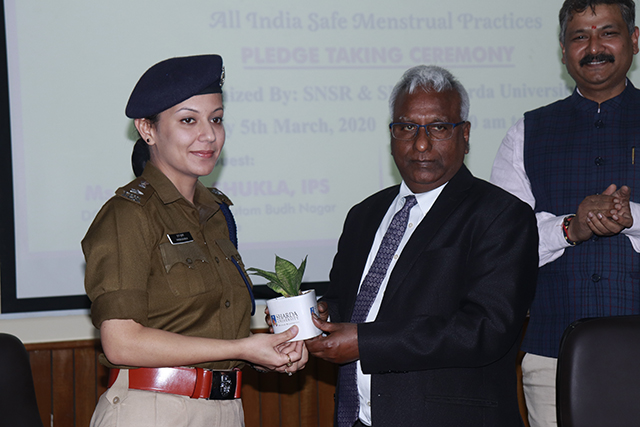PM Modi’s visit to Brussels deferred as India-EU Summit rescheduled in view of Coronavirus outbreak
Sharda University collaborates with SMDHM leads drive for Green and Sustainable Menstruation
Published on March 5, 2020
Delhi NCR: SOCIETY OF MENSTRUAL DISORDERS & HYGIENE MANAGEMENT (SMDHM) in collaboration with Sharda University has announced green menstruation drive – an initiative aimed at spreading awareness around safe and sustainable menstruation practices. Around 1000 + women came together at Sharda University to take a pledge to use sustainable menstrual options and products and help in raising awareness and change mindset aided by information on various sustainable options available in market today. More than  8,000 women from across 45 locations in India came together to take this pledge on the eve of International Women’s Day. dignitaries present on the occasion to take the pledge included Ms Vrinda Shukla IPS, DCP Women Safety, Ms Tanu Upadhyay, ACP, Women Safety, Ms Saloni Aggarwal, ACP, Women Safety, Gautam Budhnagar, Dr G R C Reddy, VC, Sharda University, Prof PL Kariholu, Pro VC, Sharda University, Dr Manisha Jindal, Dean, SMS&R, Dr Pauline Sharmila, Dean Nursing Sciences & Research, Ms Neerja Roy Chaudhary, MD, India Book of Records, Ms Lata Jain, Director, GoGirl Foundation among others. Dr G R C Reddy spoke about women safety and gender equality and motivated them for their initiative.
8,000 women from across 45 locations in India came together to take this pledge on the eve of International Women’s Day. dignitaries present on the occasion to take the pledge included Ms Vrinda Shukla IPS, DCP Women Safety, Ms Tanu Upadhyay, ACP, Women Safety, Ms Saloni Aggarwal, ACP, Women Safety, Gautam Budhnagar, Dr G R C Reddy, VC, Sharda University, Prof PL Kariholu, Pro VC, Sharda University, Dr Manisha Jindal, Dean, SMS&R, Dr Pauline Sharmila, Dean Nursing Sciences & Research, Ms Neerja Roy Chaudhary, MD, India Book of Records, Ms Lata Jain, Director, GoGirl Foundation among others. Dr G R C Reddy spoke about women safety and gender equality and motivated them for their initiative.
Chief Guest of the occasion Ms Vrinda Shukla IPS, DCP, Women Safety said “It is a great initiative undertaken by SMDHM to save the environment and promote green menstruation. The menstrual cycle is a routine faced by every woman and this initiative will encourage them to be more environment-friendly in the products they use. It is important to understand that the need of Menstrual hygiene and 2 months back I myself has switched to the greener and eco-friendly sanitary pad made up of bamboo.”
She further added “Women safety is of utmost importance; we should not encourage any kind of abuse against ourselves both at public spaces and private spaces. There are helplines where you can register your complaints and your identity will not be revealed.”
On the occasion Dr Manisha Jindal, Dean, SMS&R at Sharda University said, “A woman’s life revolves around children, they are her treasure so SMDHM has extended goals of complete health for women and children by educating them about proper disposal of menstruation sanitation products and Eco-friendly, sustainable menstruation. Through this mission of ours, we want to create awareness about hazards of single use sanitary pads and tampons and urge girls and women to switch to other eco-friendly options like cups and cloth pads.”
Elaborating on the initiative Dr Shehla Jamal, President SMDHM and Assistant Professor at Sharda University said “Disposable pads contain
90 per cent plastics and each pad is equivalent to four plastic bags, it causes both health and environmental hazards. India’s annual menstrual waste estimated at 1,13,000 tonnes where a single woman can generate up to 150 kg of non-biodegradable waste, an average of more than 11,000 disposable menstrual products throughout the course of her life. It takes around 800-1000 years to decompose plastic waste generated by 355 million of women. Sanitation workers are exposed to the risk of infections like Hepatitis C it also blocks and clogs the drainage system.”
The Ministry of Drinking Water and Sanitation (MDWS) also shows that 28 per cent of such pads are thrown with routine waste, 33 per cent are disposed of via burial and 15 per cent are burnt openly. In India, more than half of India’s women and girls use disposable napkins, translating to 44.9 billion pads per year thrown away. The carbon footprint from making disposable female hygiene products is around 15 million tonnes of greenhouse gas emissions per year – which is equivalent of burning 35 million barrels of oil.
SMDHM also registered to get recognition in the India Book of Records with a title “Maximum women taking oath on green menstruation at multiple place.”
Most of the Sharda University faculty from School of Medical Sciences, Allied Health Sciences and Nursing Sciences and Research were present for this pledge taking ceremony.











